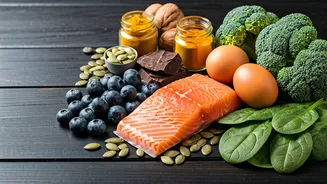Boosting Brainpower
The journey to enhanced memory and cognitive function begins with understanding the vital role of nutrition. The human brain, a complex organ, thrives
on a balanced intake of specific nutrients that fuel its activity. Numerous studies have indicated a direct correlation between dietary choices and brain health, highlighting the significance of consuming foods that actively support memory and cognitive functions. By prioritizing foods rich in essential vitamins, minerals, and antioxidants, individuals can provide their brains with the necessary resources to perform at their best. It's about providing the brain with the tools it needs to form new memories, retrieve information, and maintain overall cognitive sharpness. The following sections will introduce ten foods recognized for their ability to significantly enhance memory and cognitive capabilities. They provide the building blocks necessary for optimal brain health.
Berries: Brain's Best Friend
Berries, especially blueberries, strawberries, and raspberries, are renowned for their high concentration of antioxidants, including flavonoids. These powerful compounds combat oxidative stress and inflammation, which are key contributors to age-related cognitive decline and memory loss. Flavonoids help improve communication between brain cells, supporting neuroplasticity—the brain's ability to adapt and learn. Regular consumption of berries has been linked to improved memory, enhanced attention, and overall cognitive performance. To maximize these benefits, it is advisable to incorporate a variety of berries into your diet regularly. Whether consumed fresh, frozen, or in smoothies, berries provide a delicious and effective way to nourish the brain, potentially safeguarding memory and cognitive functions as people age. They are a simple yet powerful addition to any diet.
Fatty Fish Power
Fatty fish, such as salmon, tuna, and mackerel, are a rich source of omega-3 fatty acids, crucial for brain health. These essential fats make up a significant portion of the brain's structure and are essential for optimal cognitive function. Omega-3s, particularly DHA (docosahexaenoic acid), support nerve cell health, improve communication between brain cells, and reduce inflammation. Studies have shown that a regular intake of fatty fish can enhance memory, boost focus, and protect against cognitive decline. Consider including at least two servings of fatty fish in your weekly diet to reap these benefits. Those who don’t eat fish can get omega-3s from supplements like fish oil or algae oil, ensuring the brain receives the necessary support for sustained cognitive health.
Nuts and Seeds
Nuts and seeds, especially walnuts, almonds, and flaxseeds, are packed with essential nutrients that support brain health and memory. Walnuts are often called a 'brain food' because of their high content of omega-3 fatty acids and antioxidants. Almonds are a great source of vitamin E, which protects against age-related cognitive decline. Flaxseeds contain alpha-linolenic acid (ALA), a precursor to omega-3s, and are beneficial for brain health. These also provide vitamin E, which shields brain cells from oxidative stress. Regular consumption of nuts and seeds has been associated with improved cognitive performance and a reduced risk of cognitive decline. Incorporating a handful of nuts or seeds into your daily diet as a snack or addition to meals can be a convenient way to boost memory and protect brain health.
Dark Chocolate Delight
Dark chocolate, particularly varieties with a high cocoa content (70% or higher), offers significant benefits for brain health due to its flavonoids and antioxidants. Flavonoids enhance blood flow to the brain, improving cognitive function and memory. The antioxidants in dark chocolate protect brain cells from damage caused by free radicals, potentially reducing the risk of cognitive decline. Moreover, the moderate consumption of dark chocolate has been linked to improved mood and focus. For the best results, opt for dark chocolate with minimal added sugars. Enjoying a small square of dark chocolate can be a delicious and effective way to support your brain health and elevate your mood. Balance is key to enjoying these benefits without exceeding recommended sugar intake.
Avocados: Brain Fuel
Avocados are rich in healthy fats, which are essential for brain health and function. These monounsaturated fats support blood flow to the brain, which is crucial for optimal cognitive performance. Avocados are also rich in antioxidants, which protect brain cells from damage. The consistent consumption of avocados has been associated with improved cognitive function, memory, and concentration. Including avocados in your diet can be a delicious way to fuel your brain. They can be added to salads, sandwiches, or consumed on their own. The healthy fats and nutrients in avocados support the brain's ability to maintain its cognitive functions over time, helping to protect against memory loss.
Whole Grains
Whole grains, such as brown rice, oats, and quinoa, offer a steady supply of glucose to the brain, essential for energy and cognitive function. The brain relies on glucose as its primary fuel source, and whole grains ensure a consistent supply. They also contain fiber, which helps regulate blood sugar levels, preventing spikes and crashes that can impair cognitive performance. Whole grains also provide essential nutrients, including vitamin E and B vitamins, which support brain health. Replacing refined grains with whole grains is a simple dietary change that can significantly benefit memory and cognitive function. Regularly incorporating whole grains into meals is a straightforward approach to supporting overall brain health, enhancing memory, and improving focus.
Broccoli: Vitamin K
Broccoli is a nutritional powerhouse, packed with vitamin K and antioxidants, both of which are vital for brain health. Vitamin K is essential for cognitive function and memory. Antioxidants combat oxidative stress, protecting brain cells from damage. Broccoli also contains compounds like sulforaphane, which have anti-inflammatory effects, potentially reducing the risk of cognitive decline. Including broccoli in your diet offers significant advantages for supporting memory and cognitive performance. Regular consumption of broccoli, whether steamed, roasted, or raw, can provide the brain with the essential nutrients needed to maintain optimal function. Incorporate this versatile vegetable into meals to enhance brain health and protect against cognitive issues.
Eggs: Brain Builders
Eggs are an exceptional source of choline, a nutrient crucial for memory and cognitive function. Choline is a precursor to acetylcholine, a neurotransmitter that plays a vital role in memory and learning. Eggs also provide protein and other essential nutrients that support overall brain health. Consistent intake of eggs has been linked to improved cognitive performance and memory. Incorporating eggs into your diet, whether as part of breakfast or in other meals, can be a simple way to boost your brain health. Eggs are highly versatile and offer essential nutrients, contributing to cognitive sharpness and improved memory recall. They are a practical and effective addition to any diet focused on brain health.
Leafy Greens
Leafy green vegetables, such as spinach, kale, and collard greens, are rich in vitamins, minerals, and antioxidants essential for brain health. These vegetables are particularly high in vitamin K, folate, and lutein, which support cognitive function and memory. Folate helps reduce inflammation, and lutein acts as an antioxidant. The regular consumption of leafy greens has been associated with improved cognitive performance and a decreased risk of cognitive decline. To maximize these benefits, incorporating a variety of leafy greens into your daily diet is highly advisable. Consume them raw in salads, lightly steamed, or added to smoothies. This provides essential nutrients that safeguard brain health, ensuring optimal cognitive function and improved memory.




















